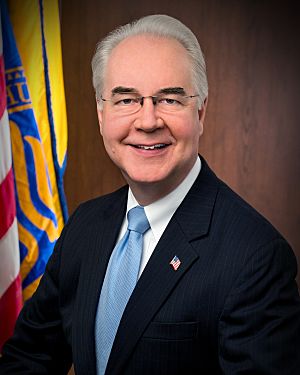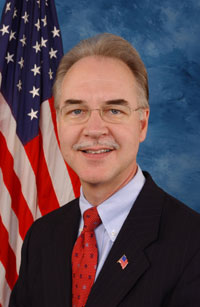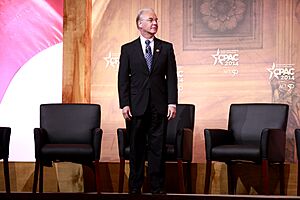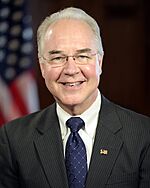Tom Price (American politician) facts for kids
Quick facts for kids
Tom Price
|
|
|---|---|

Official portrait, 2017
|
|
| 23rd Secretary of Health and Human Services | |
| In office February 10, 2017 – September 29, 2017 |
|
| President | Donald Trump |
| Preceded by | Sylvia Mathews Burwell |
| Succeeded by | Alex Azar |
| Chair of the House Budget Committee | |
| In office January 3, 2015 – January 3, 2017 |
|
| Preceded by | Paul Ryan |
| Succeeded by | Diane Black |
| Member of the U.S. House of Representatives from Georgia's 6th district |
|
| In office January 3, 2005 – February 10, 2017 |
|
| Preceded by | Johnny Isakson |
| Succeeded by | Karen Handel |
| Majority Leader of the Georgia Senate | |
| In office November 14, 2002 – June 17, 2003 |
|
| Preceded by | Charles W. Walker |
| Succeeded by | Bill Stephens |
| Minority Whip of the Georgia Senate | |
| In office November 6, 1998 – November 14, 2002 |
|
| Preceded by | Eric Johnson |
| Succeeded by | Robert Brown |
| Member of the Georgia Senate from the 56th district |
|
| In office January 3, 1997 – January 3, 2005 |
|
| Preceded by | Sallie Newbill |
| Succeeded by | Dan Moody |
| Personal details | |
| Born |
Thomas Edmunds Price
October 8, 1954 Lansing, Michigan, U.S. |
| Political party | Republican |
| Spouse | Betty Clark |
| Children | 1 |
| Education | University of Michigan (BA, MD) |
Thomas Edmunds Price (born October 8, 1954) is an American doctor and Republican Party politician. He served as a U.S. representative for Georgia from 2005 to 2017. During his time in Congress, Price led important committees like the House Budget Committee.
In 2017, President Donald Trump chose him to be the Secretary of Health and Human Services. He held this job from February to September 2017. Price resigned from this role after people criticized his use of government money for private jet travel. Later, a government watchdog group suggested that Price should pay back some of the money used for these trips.
Contents
Tom Price's Early Life and Medical Career
Thomas Edmunds Price was born in Lansing, Michigan, in 1954. He grew up in Dearborn. Both his father and grandfather were doctors, and as a child, Price sometimes went with his grandfather on house calls (doctor visits to patients' homes).
Price studied at the University of Michigan, earning his bachelor's degree in 1975 and his medical degree in 1979. He then trained in orthopedic surgery (bone and joint surgery) at Emory University School of Medicine in Atlanta. In 1984, he started his own medical practice. He also taught orthopedic surgery at Emory University. He was the director of the orthopedic clinic at Grady Memorial Hospital, where he met his wife, Betty.
Before entering politics, Price was active in the Republican Party. He also worked with the Medical Association of Georgia in the early 1990s. They opposed a healthcare plan proposed by President Clinton at that time.
Serving in the Georgia Senate (1996–2005)
Price first decided to run for office in 1995. A state senator named Sallie Newbill, who was retiring, asked him if he wanted to take her place. Price agreed and won the election for Georgia's 56th senate district. He won again in 1998, 2000, and 2002.
Price has said that he got involved in politics because he was unhappy with how the government regulated the healthcare industry.
Leadership Roles in the Senate
In 1998, Price was chosen as the minority whip for the Georgia state senate. This meant he helped lead the Republican Party, which was the smaller party at the time. In 2002, Republicans gained control of the state senate. Price was then elected as the majority leader, becoming the first Republican to hold this position in Georgia.
Serving in the U.S. House of Representatives (2005–2017)
In 2003, Price announced he would run for a seat in the United States House of Representatives. He wanted to represent Georgia's 6th congressional district. This seat was open because the current representative, Johnny Isakson, was running for the U.S. Senate.
The 6th district was known for strongly supporting Republicans. This meant that whoever won the Republican primary election was very likely to win the main election. Price faced several other candidates, including other state senators and representatives.
Price worked hard to raise money for his campaign. He received many donations, including a significant amount from the healthcare industry. In July 2004, Price won the first round of voting with 35% of the votes. Since he didn't get more than 50%, he had to go into a second round of voting (a runoff election) against the second-place candidate. Price won the runoff election in August and then won the general election without any opponents.
Re-election Campaigns
Price continued to win re-election for his House seat many times.
- 2006 Election: The district lines were redrawn in 2005. Price faced a Republican challenger who criticized his stance on immigration and trade. Price won the primary election easily. He then faced a Democratic challenger in the general election and won with 72% of the votes.
- 2008 Election: Price ran against a Democratic candidate who was concerned about Price's opposition to expanding the Children's Health Insurance Program. Price won with 69% of the votes.
- 2010-2014 Elections: Price ran unopposed in the Republican primary elections in 2010, 2012, and 2014. He won the general elections against Democratic challengers in 2012 and 2014 with strong majorities.
- 2016 Election: Price won the Republican primary without opposition. In the general election, he faced a Democratic challenger who was not very active in the campaign. Price won with 61% of the votes.
Key Roles in Congress
Price held important leadership positions in the House of Representatives.
- In 2008, he became the chair of the Republican Study Committee.
- Two years later, he was chosen to lead the House Republican Policy Committee. This made him one of the top five Republicans in the House.
- He also joined the powerful Ways and Means Committee and the Budget Committee.
- In 2012, he became the vice-chair of the Budget Committee.
- In 2014, Price took over as the chair of the Budget Committee, following Paul Ryan.
In 2012, Price tried to become the chair of the House Republican Conference, which would have made him the fourth-highest-ranking Republican. He had support from many conservative groups and politicians. However, he lost the election.
Political Views and Voting Record
Price was known as one of the most conservative members of Congress.
Healthcare Views

Price believed that vaccines do not cause autism. He also thought that states should decide if vaccinations are required, which is how U.S. law currently works.
As a representative, Price voted many times to get rid of the Patient Protection and Affordable Care Act (often called Obamacare). He even introduced his own healthcare bill in 2009, which he updated over the years. This bill was seen as a major Republican alternative to Obamacare.
Price also supported plans to change Medicare, a government health insurance program for older Americans. He voted against a law that would have given the Food and Drug Administration power to regulate tobacco products.
Economic Policy

Price voted to reduce government spending. He supported a law that would require the President to show how the budget would be balanced. He also voted to stop federal funding for National Public Radio (NPR) and to end a program that helped people with their mortgages.
Environment and Energy
Price did not agree with the widely accepted scientific view on climate change. He signed a pledge promising to vote against any global warming laws that would raise taxes. He also said that the science behind global warming had "errors."
He voted against laws that would have kept limits on offshore oil and gas drilling. He also voted against removing tax breaks for oil and gas companies and against providing tax incentives for renewable energy sources. Price supported laws that would prevent the Environmental Protection Agency from regulating dust from farms and from listing manure as a hazardous substance.
Foreign Policy
Price voted to extend the Patriot Act, a law passed after 9/11 to help fight terrorism. He also believed that states should not have to take part in programs that resettle refugees.
He voted for laws that would reduce U.S. funding for the United Nations unless certain changes were made. He also supported strengthening sanctions (penalties) against Syria.
Gun Policy
Price was against gun control. He consistently received high ratings from gun rights groups like the NRA Political Victory Fund.
He supported a law that protects gun makers and sellers from lawsuits when crimes are committed with their products. He also supported a law that would make concealed carry permits (allowing people to carry hidden guns) valid across the entire country.
Immigration Views
Price believed that illegal immigrants in the United States should be deported. He also supported changing the Fourteenth Amendment to the United States Constitution to prevent children born to illegal immigrants in the U.S. from automatically becoming citizens.
Legislation Sponsored by Price
Price was the main sponsor of the Empowering Patients First Act (EPFA). He introduced this bill multiple times. It was designed as a Republican alternative to the Affordable Care Act. This bill aimed to create tax credits for health insurance, allow health insurance to be sold across state lines, and change rules for medical lawsuits.
He also introduced the Pro-Growth Budgeting Act of 2013. This bill would require government offices to analyze how new laws would affect the economy. Price believed this was important to make sure policies would help the economy grow and reduce national debt.
Committee Assignments
- Committee on the Budget (chair 2015–2017)
- Committee on Ways and Means
- Subcommittee on Health
- Subcommittee on Human Resources
Involvement in Presidential Elections
Price supported Mitt Romney in the 2008 Republican presidential primaries and Newt Gingrich in the 2012 primaries. In 2016, he first supported Marco Rubio and was against Donald Trump, saying Trump would be "dangerous." However, once Trump became the likely Republican nominee, Price changed his mind. He worked to get other Republican House committee chairs to support Trump. On May 13, 2016, they all publicly endorsed Donald Trump for president.
Secretary of Health and Human Services
On November 29, 2016, Donald Trump nominated Tom Price to be the United States Secretary of Health and Human Services. The Senate approved his nomination on February 10, 2017.
As Secretary, Price supported the American Health Care Act of 2017. This bill was proposed by House Republicans to change parts of the Affordable Care Act. When a government office estimated that this bill would result in 24 million fewer Americans having health insurance, Price strongly disagreed with their findings.
While he was Secretary, Price said that the Affordable Care Act's rule requiring people to buy health insurance increased healthcare costs. However, after he left the job, he admitted that removing this rule could lead to fewer young and healthy people buying insurance, which would then make healthcare more expensive for others.
Personal Life
Tom Price and his wife, Betty, live in Roswell, Georgia. They have one child, Robert Price. Betty Price also served on the Roswell City Council and was elected to the Georgia House of Representatives in 2015. Price is a Presbyterian.
In 2014, Price's net worth was estimated to be around $13.6 million.
See also
 In Spanish: Tom Price para niños
In Spanish: Tom Price para niños
- Physicians' Council for Responsible Reform
- Physicians in the United States Congress
 | Emma Amos |
 | Edward Mitchell Bannister |
 | Larry D. Alexander |
 | Ernie Barnes |




